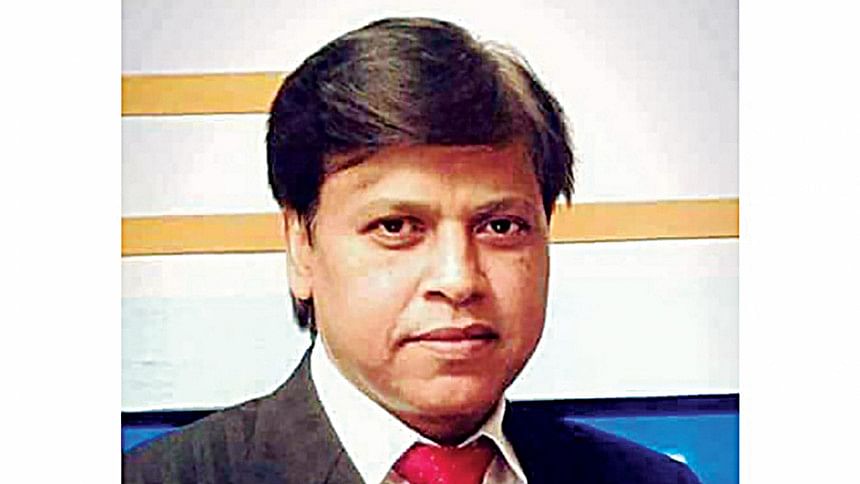Stalemate with regard to the MP’s vacation of seat upon foreign court’s conviction

Of late a sitting-member of the current parliament named Mr. Shahid Islam alias Papul has been arrested in Kuwait on charges of human trafficking and money laundering. An application for bail was immediately placed at local court, but his legal attempt to get released from the detention fell through. According to media reports, he was not there on his official capacity rather he was staying there for business purposes. The indictment, if convicted, may result in an imprisonment of minimum seven years and maximum fifteen years under section 178 of the Kuwaiti Penal Code, 1960.
Article 67 of the Constitution to be read with Article 66(2) provides certain situations where a seat in the parliament may get vacated. These grounds include conviction for a criminal offence involving moral turpitude of which the sentence of imprisonment must be for two years at least and a period of five years must elapse since his release. The competency for an election and the capacity to hold the seat after taking the oath – both must satisfy the stated criterion set by the Constitution. To date, we have not seen an instance where a sitting MP had to vacate his office upon conviction pronounced by a court. Not to be confused, in Janata Tower Corruption Case, the Appellate Division upheld the Sessions Court's conviction against HM Ershad on corruption charges and the final sentence of imprisonment exceeding three years prospectively disqualified him to contest the 8th parliamentary election in 2001.
Linking it to MP Papul's context, the court dealing with the case is situated in a foreign state and regulated under different laws than those of Bangladesh. Since our Constitution did not specify which court conviction will results in the vacation of seat, the prime question now stands whether our Constitution intended to attract the jurisdiction of both domestic and foreign courts in this regard. The case would have been a straightforward one if it had been a case under domestic jurisdiction. Unfortunately, the words inscribed in the Constitution are not enough to draw a definite conclusion to this question. Interpretations coming from legal scholars are polar opposite to each other. It is either foreign court's conviction for a criminal offence calls for vacation of seats or it does not. The word 'court' should be construed as a court of competent jurisdiction. Since he was physically present during the commission of alleged crime in a foreign country, he must accept the foreign laws as obligatory upon him and violation of which legitimately calls for foreign court's jurisdiction over him. There is simply no other way to deny the jurisdiction of Kuwait over MP Papul.
Once the question of jurisdiction settles down, the question of enforceability stands up. In order to establish a nexus between these two, the first inquiry should be into whether a foreign court's criminal conviction is enforceable in Bangladesh or not. If the answer is in the negative, how does it carry the same weight as a competent domestic court does? Wanting to remove an MP based on an unenforceable foreign verdict would be profoundly unfair. However, the entire scenario needs to be more cautiously interpreted in light of the Constitution and relevant practices.
Though we do not have any provision where the domestic law permits to execute foreign court's criminal judgment, there are instances where the execution of foreign judgments of civil nature is permitted. Under the Code of Civil Procedure, 1908 foreign judgments are deemed to be judgment pronounced by a domestic court upon fulfilling court's satisfaction thus enforceable in Bangladesh. Foreign arbitral awards are also recognised and enforceable under Section 45 of the Arbitration Act, 2001. Section 4 of the Digital Security Act, 2018 confers an extra-territorial jurisdiction where the court can take cognizance of crimes committed outside the territory of Bangladesh. So, the enforcement of foreign judgments in our country is not alien to our legal system.
In this very case, MP Papul has been allegedly partaken in human trafficking and money laundering which are both punishable offences under our domestic law. If the request for repatriation fails, it is likely that he is going to face the prosecution. If the charges are proved beyond reasonable doubt, he will be imprisoned for a period to be determined by the court. As our current parliament is in the middle of its second year, longer sentence will put a bar to his returning home and who can tell for sure that this parliament will still be there when he gets back. However, this is certainly not an incident of one-off kind, and the repetition of the same incident is unexpected but not unlikely. A proper guideline in this regard is necessary and if the same incident takes place in future, it will establish a perilous precedent.
THE WRITER IS A FINAL YEAR LAW STUDENT, BANGLADESH UNIVERSITY OF PROFESSIONALS (BUP).

 For all latest news, follow The Daily Star's Google News channel.
For all latest news, follow The Daily Star's Google News channel. 


Comments